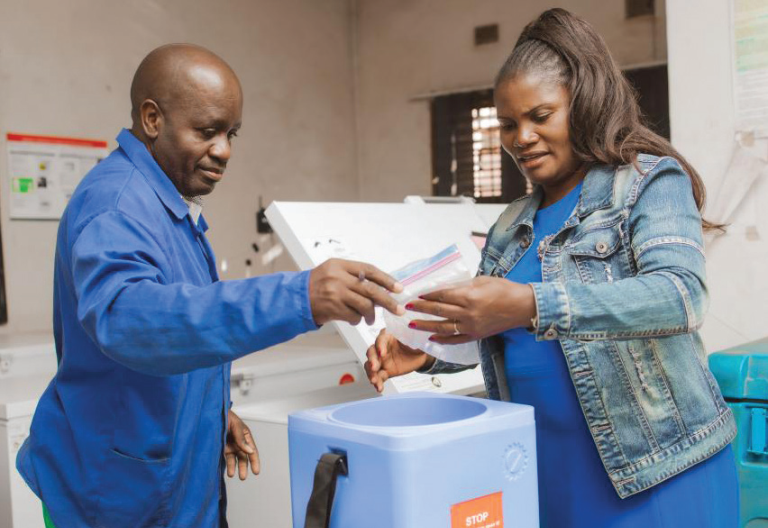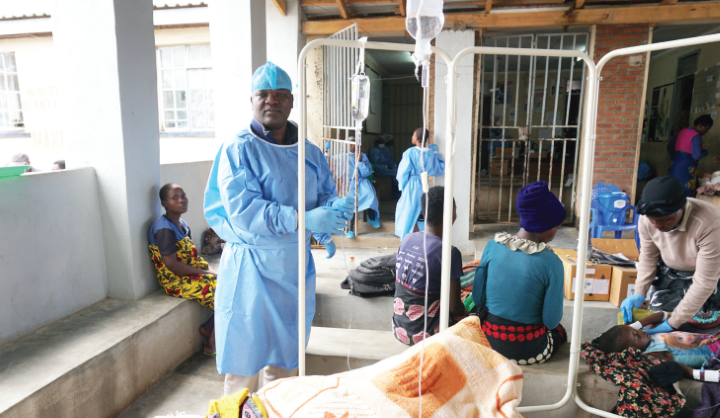What keeps Covid jabs cool?
Florence Kamwendo became a community health worker in 1994, two years after Malawi wiped out polio by vaccinating every child aged under five.
The feat showed the health surveillance assistant (HSA) how a simple, safe and effective vaccine can save generations from contagious diseases that endanger their health and chances in life.

“Then I didn’t know that my generation would be hit hard by another vaccine-preventable outbreak as did polio in the preceding decades,” she recalls.
Now Kamwendo and her cadre, clad in sky-blue uniforms, go door to door vaccinating people against Covid-19, which has claimed over 2 600 lives from Malawi’s 85 900 confirmed patients.
She says there is no time to relent until everyone gets vaccinated.
On June 24 2021, Kamwendo gave President Lazarus Chakwera a pep talk when he received his second AstraZeneca jab at Mtunthama State Residence in Lilongwe.
“Amid the deadliest Covid-19 wave, I told the President that it’s important for everyone to get the vaccine because it is a trusted weapon against the pandemic. I also assured him that the vaccine is safe,” she recounts.
The image of Chakwera receiving the jab in the comfort of his home symbolises the country’s push to vaccinate everyone close to where they live, work or meet.
Kamwendo has vaccinated people at Capital Hill where big government decisions are made, in markets where crowds from all walks of life meet and in communities where many live.
“The vaccine carrier has become a trusted partner in the fight against Covid-19. If anyone wants the jab, we shall go to them. We have no dose or time to waste,” she says, clutching her blue box.
But the long-serving HSA’s inroads are nothing without proper cooling props, she states.
Kamwendo thanks Unicef for providing enough boxes for carrying vaccines from the district stores to health centres and surrounding communities.
The assistance from the Government of Japan has modernised the cold chain at Lilongwe District Health Office (DHO) vaccine store and on the move. It includes cold boxes like Kamwendo’s and new vaccine refrigerators that have replaced stuttering gas-powered fridges that hummed nosily and broke down effortlessly.
The HSA says the “timely assistance” has improved the storage and delivery of the vaccines that easily perish unless stored in a cool place.
“When replenishing the vaccines, I no longer plug my ears because the new refrigerators are so noiseless you would think they are off. This means the people are getting unexpired doses stored at the recommended temperature in the fridges and our carriers for community outreach,” she narrates.
For the HSA, taking vaccines closer to communities helps demystify the preventive measure widely associated with myths and misconceptions.
“During the special Covid-19 vaccination week in April, I vaccinated over 50 touts at Lilongwe Bus Depot next to our offices. The young men were once fierce critics of Covid-19 vaccines, but they were happy to protect themselves from future Covid-19 waves because they had seen other people, including the President, being vaccinated,” says Kamwendo.
The week set aside to celebrate Covid-19 vaccination helped the national Extended Programme on Immunisation (EPI) to utilise 277 000 AstraZeneca doses expected to expire in May 2022. A similar campaign delivered about 750 000 doses that would have expired in November and December last year.
This excites Boston Gwaluka, the cold chain technician at Lilongwe DHO, which has vaccinated about 480 000 of the target population of 1.8 million.
“I feel bad when a single vaccine dose expires because vaccines are expensive. Ensuring that each reaches someone before it loses its effectiveness is the best way to thank our partners. This is our job; we cannot afford to fail,” he says.
When he arrived in Lilongwe six years ago, Gwaluka had to quickly learn to improvise to reduce the chilling effect of gaps in the district cold chain system.
He explains: “The situation was bad as the old refrigerators weren’t reliable. Some of them were over 10 years old. They often broke down and could not keep the vaccine temperature stable.
“During breakdowns and blackouts, we had to quickly evacuate the vaccines to the national vaccine store on the other side of the city. But the situation was tricky when vehicles or fuel were not available.”
Gwaluka thanks the Ministry of Health’s partners for closing the cold chain gaps in time for the Covid-19 and polio vaccination running alongside the routine immunisation for children below five.
“The improved cooling facilities help us safely store different vaccines and deliver them to the health centres and communities where many people are being reached by our door-to-door vaccination teams so that no one is left behind,” he explains.
Gwaluka said the additional vaccine carriers have not just reduced shortages and scrambles in health facilities that had too few to deliver different vaccines together.
“They safely carry more doses to remote communities where many endure long walks to health facilities,” he says. “As more people remain unvaccinated, we cannot afford to lose a dose in our cold chain. Improved cooling facilities keep vaccines going where they are needed.”





